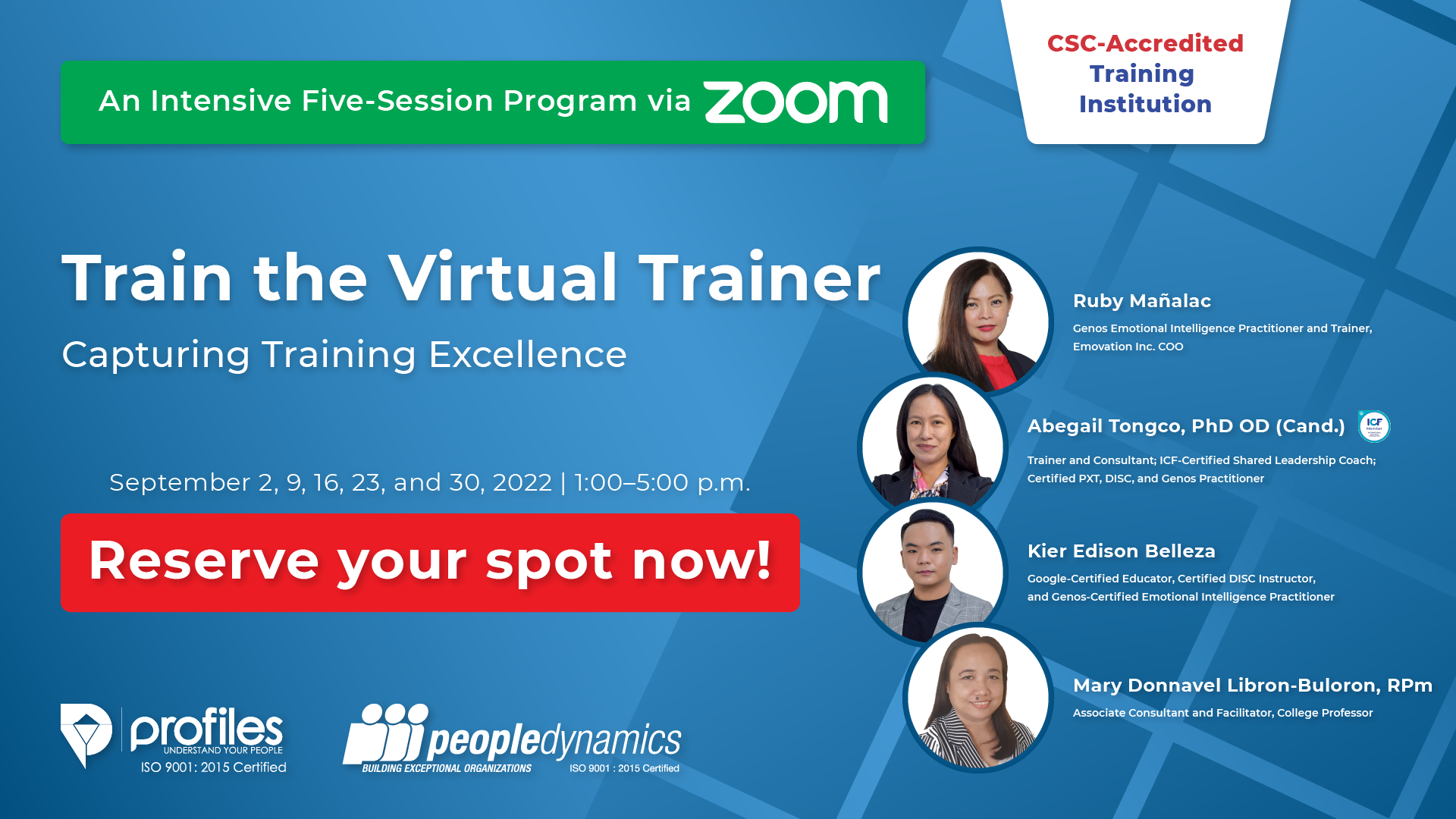Train the Virtual Trainer: Capturing Training Excellence
September 2, 2022 @ 1:00 pm - September 30, 2022 @ 5:00 pm
|
₱3999 – ₱19999
In this period of physical-distancing regulations, the ability to sustain valuable connections has become a vital skill for trainers, teachers, speakers, and leaders.
Facilitating learning despite the lack of visual cues from nonverbal behaviors and facial expressions has become a challenge for trainers, teachers, and speakers.
On the other hand, ensuring understanding and comprehension in collaborative online meetings has become a top priority for leaders.
The course aims to establish the use of appropriate online tools and provide effective online feedback and monitoring.
This five-session online training is designed for
- trainers and teachers who wish to develop their competence in sustaining learners’ engagement,
- speakers who desire to continue their advocacies through online platforms, and
- leaders who aim to facilitate effective online meetings and sessions.
Ruby Mañalac
Objectives
At the end of the first session, participants shall be able to
- learn the principles of building rapport by establishing a climate of trust and respect in the group,
- discover the latest trends and best practices in e-learning, and
- develop the skills required of an emotionally intelligent facilitator.
Making Connections: What Matters Most
- Trends in Online Facilitation
- Researches in Relation to Online Learning Programs
- How to Deliver Meaningful Sessions
- The Emotionally Intelligent Facilitator
Outputs
At the end of the first session, participants shall
- come up with a list of skills that they need to develop and learn to become a successful virtual facilitator and
- develop resolutions based on their learnings from the session.
Abegail Tongco
Objectives
At the end of the second session, participants shall be able to
- understand how the principles of adult learning are applied in an online classroom,
- discover the various roles and responsibilities of an online facilitator,
- develop the skills required to surpass the challenges of online learning,
- discover the different e-learning modalities, and
- learn how to run a successful online session.
Content
Sustaining Learning: Upskilling and Reskilling
- The Roles of an Online Facilitator
- The Responsibilities of an Online Facilitator
- Self-Assessment: Digital Literacy
- Constraints in Online Learning
- The Many Hats of an Online Facilitator
- The Different Learning Modalities (Synchronous, Asynchronous, and Hybrid)
- Online Facilitation Checklist
- Conditions That Must be Present for Learning and Comprehension to Happen
Outputs
At the end of the second session, participants shall
- come up with a checklist to be used in preparing for an online session and
- develop their resolutions based on the results of their digital-literacy assessments and learnings from the session.
Objectives
At the end of the third session, participants shall be able to
- understand how the principles of sustaining learner engagement are applied in an online classroom,
- discover various online-facilitation strategies to sustain learners’ attention and motivation,
- develop the skills required to utilize various digital tools for online learning, and
- learn how to apply learnings to enhance meetings and sessions at work.
Content
Fostering Learner Engagement: Motivating Learners
- Online Facilitation Strategies
- Best Practices in Running Effective Learning Sessions
- Best Practices in Running Effective Online Meetings
- Techniques to Foster Engagement in Discussion Forums
- Technological Tools and Softwares for Collaboration and Interaction
- Kahoot/Mentimeter/Pollev
- Padlet
- Jamboard
- Shared Slide/Slide.do
- Shared Sheets
- Google Classroom
Outputs
At the end of the third session, participants shall
- come up with a sample workshop activity utilizing the various digital tools and
- develop their resolutions on how they can apply these tools in the workplace.
Kier Belleza
Objectives
At the end of the fourth session, participants shall be able to
- understand how the principles of learning facilitation is applied in an online classroom;
- discover various skills required in facilitating a memorable, meaningful, and motivational learning program; and
- develop the skills required to utilize various digital tools for preparing attractive instructional materials.
Content
Facilitating Effective Sessions: Ensuring Understanding
- Techniques for Live Online Sessions
- Tips for Online Facilitators
- Creating Attractive Instructional Materials
- Canva
- PowerPoint
- Pear Deck
- Tips to Ensure Effective Presentations
- Dos and Don’ts in Online Sessions
Outputs
At the end of the session, participants shall
- come up with a sample video demonstrating the discussed online facilitation skills and
- develop a sample instructional material using the tools demonstrated during the session.
Donnavel Buloron
Objectives
At the end of the last session, participants shall be able to
- learn the principles of analyzing training needs,
- discover the latest trends and best practices in managing the learning-and-development system, and
- develop the skills required to develop a competency-based training-evaluation program.
Content
- Conducting Training-Needs Analysis
- Best Practices in Learning and Development
- Competency-Based Training Evaluation
Outputs
At the end of the last session, participants shall
- come up with a training-needs analysis form and
- develop a training-evaluation form.
People Dynamics is an accredited Learning and Development Institution by Profiles International, LLC., Wiley, Genos International, Civil Service Commission, and the Professional Regulation Commission.


